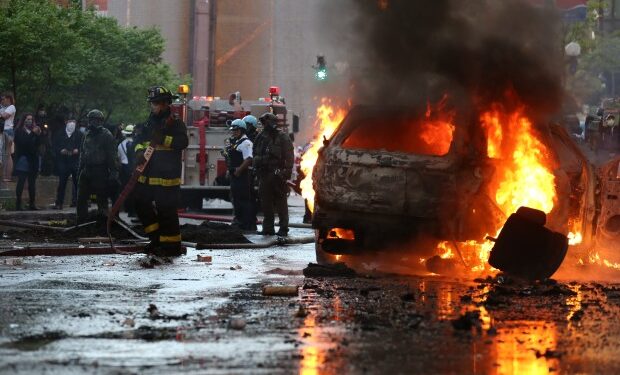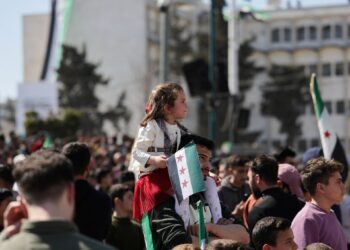As the first day of the Democratic National Convention has finally arrived, Chicago officials promise they are prepared for large protests soon to kick off near the United Center.
Police Superintendent Larry Snelling told reporters at a news conference Monday morning that his officers passed an important early test over the weekend with a smaller march along the Magnificent Mile.
Snelling said there were no arrests directly associated with the march. A 23-year-old woman was arrested nearby and charged with defacement of public property and resisting arrest, but she was not part of the demonstration, he said.
“Yesterday we had a protest and our officers responded exactly the way that we trained them,” Snelling said. “There was mutual respect there and because of that we didn’t have any incidents. … (The demonstrators) were able to have their voices heard and we protected them while they were doing it.”
Snelling said he hoped to see more of the same as the demonstrations were expected to grow much larger beginning on Monday. He reiterated his previous comments that the police were there to protect not only the First Amendment rights of demonstrators, but also the safety of the convention attendees and the general public.
“We prefer not to have clashes, we would prefer not to make arrests if we don’t have to, and we will avoid these things as long as we’re not engaged in acts of vandalism or violence,” Snelling said.
The entire CPD is scheduled to work during the four-day convention, and officers can expect the department’s deployment plans to return to normal on Friday, Snelling said.
Derek Mayer, the deputy special agent in charge of the Secret Service’s Chicago office, praised the collaborative planning among the various agencies handling DNC security.
“I’m proud to finally put that plan into action,” Mayer said.
Meanwhile near the convention site, protesters began gathering Monday morning for what is expected to be a significant pro-Palestinian demonstration and march.
Some were at Union Park before 8 a.m. to set up equipment for the rallies to held in the park during the convention.
Union Park was bright and breezy, and by 9:30 hundreds had gathered to distribute signs and water bottles ahead of the planned rally.
Piles of printed picket signs lay on the grass, with slogans like “End US Aid to Israel” and “Justice, peace and equality!” One featured a picture of President Joe Biden with glowing red eyes and read “Democrats fund the genocide of Palestinians.”
Some demonstrators carried hand-painted signs: “My vote will not be for Israel or Black Rock wars,” read one sign above a painting of an Israeli flag smeared with red.
Chicago is getting set for DNC protests. Here’s a rundown of what to expect.
Volunteers estimated that about 10,000 signs were made for the anticipated throngs of demonstrators to carry during Monday afternoon’s march. Many of those signs could be seen lying in the grass waiting to be carried during the protest.
Protesters around the country have heavily criticized the Biden administration’s response to the Israel-Hamas conflict and Democratic politicians’ support of Israel. With the most powerful Democrats gathering at the United Center, Chicago is expected to become a focus point.
Israel’s ongoing invasion of Gaza, triggered by Hamas’ Oct. 7 terror attack, has killed tens of thousands of Palestinians and led to widespread destruction in Gaza, accusations of detainee abuse and ongoing fears of a wider war in the Middle East.
The march from Union Park only materialized after the coalition of organizers sued the city in federal court, alleging the city was violating their First Amendment rights by denying permits to demonstrate within “sight and sound” of the convention hall.
The lawsuit resulted in the new route that will take the demonstrators within a few blocks of the United Center, although organizers have continued to complain about the length of the route and that it diverts onto narrower side streets.
At the news conference Monday, Snelling said “the length of the route doesn’t matter” as much as control efforts put in place in advance, including by the demonstrators who have proven to be “very good at policing themselves and each other.”
“We have a way of keeping everybody in line and keeping them on the route,” Snelling said. “This won’t be a log jam.”
Meanwhile, on Friday, Mayor Brandon Johnson personally intervened in another dispute over the city’s denial of a permit to set up stages and sound systems for the Union Park rally.
“We talked directly to the mayor,” Hatem Abudayyeh, executive director of the Arab American Action Network, said during a news conference in Federal Plaza after the deal was struck. “We knew that he supported us, our coalition and these protests and it’s proof positive that he called one of the top leaders of the coalition directly on his cellphone and said ‘We’re gonna make this happen. I’m gonna make sure that everybody’s rights are protected.’”
For Chicagoans, especially those who live and work near the United Center and McCormick Place, all that remains to do is wait and see what the day brings as far as demonstrations.
The city saw wide-scale protests in 2020 after George Floyd was killed by Minneapolis police, gatherings that began peacefully but eventually spun out into widespread looting and rioting across the city. Unrest flared again downtown in August of that year, leaving two people shot and multiple police officers injured.
Police and city officials were widely criticized for their response to the chaos; while addressing DNC preparations this year, Snelling — who took charge of the department last year — has said CPD was unprepared to handle the looting and violence of 2020.
While that mayhem is fresh in Chicagoans’ memories, the circumstances of the DNC are significantly different. Far from the spontaneous gatherings of 2020, the largest expected demonstrations around the United Center have been pre-planned, scheduled and permitted to the hilt.
All eyes will be on Chicago this week. Can the DNC help reverse the city’s national narrative?
The security perimeters were unveiled weeks ago and the legal challenges over marching routes have been ironed out. Meanwhile, scores of CPD officers have undergone hours upon hours of enhanced training, focused largely on crowd control and demonstrators’ civil rights.
Hundreds of extra cops from across Illinois — and more from Milwaukee, where the Republic National Convention was held last month — will be dispersed across the city, as well. Officials have stressed that out-of-town officers will be safeguarding infrastructure like bridges and underpasses that could be targeted by bad actors, not patrolling neighborhoods or interacting with the public, though specific plans and assignments remain fluid.

The whole world is watching once again.
Snelling has said ad nauseam that the First and Fourth amendment rights of protesters will be honored by the city’s police, who will be outfitted with body-worn cameras. Vandalism and violence, though, will be quickly squelched, authorities have promised.
“We will not allow people to come here and destroy this city,” Snelling said this week at the City Club of Chicago.
The superintendent has been quick to note, too, that the city and CPD routinely handle large-scale events every summer, such as Lollapalooza and the NASCAR Chicago Street Race.
A gathering of thousands outside the United Center is not a new scenario, either. It happens dozens of times a year after Bulls and Blackhawks games and concerts. But with the DNC, the potential — even likelihood — of bad actors looking to sow chaos is of course far greater.
The city’s Office of Inspector General released a report in late May highlighting concerns about CPD’s preparedness for the anticipated demonstrations, saying the department’s training and policies to manage crowds “are insufficient and may increase the risk of infringement of lawful demonstrators’ constitutional rights.”
Over the last decade, during summer months, CPD officers have often struggled to contain large youth gatherings in and around the downtown area. Some of those gatherings — teen “trends” — have ended in fatal shootings.
And as political and media figures hobnob in the United Center during a highly choreographed spectacle, most Chicagoans will attempt to go about their daily lives as the summer season enters its final month.

CPD officers will see their shifts extended and some scheduled days off canceled, but Snelling has pledged that the security needs of the DNC will not leave the rest of the city in a lurch.
“This is not just about the Democratic National Convention,” Snelling said in July. “The Chicago Police Department has an obligation to the entire city of Chicago. Every single neighborhood we will be protecting. And we’re looking at our manpower, we’re looking at our allocations, and we want to make sure and we will make sure that the neighborhoods who need us the most, we will be there for those neighbors. We will be there for the entire city of Chicago.”
This is a developing story. Please check back for updates.
Originally Published:







